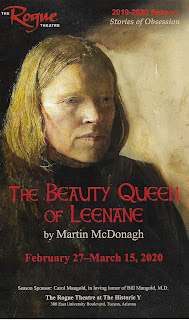The Beauty
Queen of Leenane by Martin McDonagh at
the Rogue Theatre was definitely not another episode of Celtic Woman, but this production has softened the show a
bit over the ten years since I saw it last. Another explanation is we have
become more accustomed to rapid shifts from comic bickering to abject terror in
contemporary drama. Director Christopher
Johnson signals early in his program notes that the play is “a folk tale about
the impact of scarcity on the human condition.” Yet I see little visually or in the characters
to support this contention. Some actions
in the show still turn the stomach-- witness the gasps as Mag pours her chamber
pot into the kitchen sink, but overall some of the edges have been blurred.
The set is
not as dark, depressing, cluttered, and seedy as in the earlier production I referred
to. The filthy electric stove was the only item that keyed the disarray brought on by years of scarcity. The rest of the environment was too clean and neat as a pin. A minor quibble was that the electric kettle on the
stove seemed too fresh and new and was used constantly and never refilled.
The characters in the Rogue production also seemed softer.
Ray was funnier than I remembered and the women seemed to be pretty energetic in
spite of appearing to live on lumpy porridge and stale biscuits. We certainly
got to spite in spades, but we might have signaled it better earlier. As I said to the wife. The first time we saw it, it was raw and
nasty; now it was still shocking but we were encouraged to think with a bit
more sympathy about the complexity of the characters.
The fact that we are encouraged to search for motivations may
be what director Christopher Johnson was looking for. On the other hand
McDonagh gives us so little information about
what caused this horror and no apparent reason why Maureen was not tried
and incarcerated that I think the playwright has played us a bit
false. Ultimately I have to conclude
that both women are crazy as loons and I’m not sure that I want to stay
interested. I am perfectly aware that some actions, even matricide, do not give
up reasons easily, but McDonagh is not writing in the mode of Beckett. It is a work couched in surface realism and the
director has admitted to this by giving it a realistic setting and stating that
the show resisted the kind of imaginative treatment that highlighted the recent
Rogue production of Moby Dick.
Ultimately I
glory in a foursome of grand performances by Holly Griffith, Cynthia Meier,
Ryan Parker, and Hunter Hnat, but confess that I did not fall in love with the
play this time either. That doesn’t mean that I prefer the Celtic Woman.
A final
note. I loved the Program Cover Helga
painting by Andrew Wyeth even though the identifiable portrait of a German model who probably had a relationship with the painter to
represent the Irish leading character who had only two kisses in her life was a bit odd.





No comments:
Post a Comment